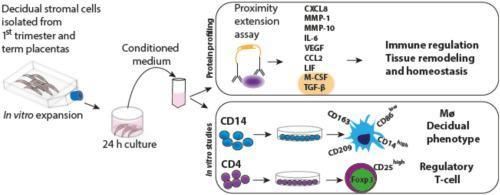Journal of Reproductive Immunology ( IF 2.9 ) Pub Date : 2021-05-12 , DOI: 10.1016/j.jri.2021.103330 R Lindau 1 , S Vondra 2 , J Spreckels 1 , M Solders 3 , J Svensson-Arvelund 1 , G Berg 4 , J Pollheimer 5 , H Kaipe 3 , M C Jenmalm 1 , J Ernerudh 6

|
During pregnancy, the semi-allogeneic nature of the foetus requires maternal immune adaption and acquisition of tolerance at the foetal-maternal interface. Macrophages with regulatory properties and regulatory T (Treg) cells are central in promoting foetal tolerance and are enriched in the decidua (the uterine endometrium during pregnancy). Although tissue-resident decidual stromal cells (DSC) have been implicated in regulatory functions, it is not known if they are able to induce the regulatory phenotype of macrophages and T-cells. In this study we report that maternally derived DSC are able to induce homeostatic M2 macrophages and Treg cells. CD14+ monocytes and CD4+ T-cells from healthy non-pregnant women were cultured in the presence or absence of conditioned medium (CM) from DSC isolated from 1st trimester and term placentas. DSC-CM alone was able to promote the survival of macrophages and to induce a regulatory CD14brightCD163+CD209+CD86dim phenotype, typical for decidual macrophages and similar to that induced by M-CSF. Interestingly, DSC-CM was also able to overrule the pro-inflammatory effects of GM-CSF by upregulating CD14, CD163 and CD209. Protein-profiling showed that M-CSF was secreted by DSC, and blocking of M-CSF partially reversed the M2 phenotype and reduced viability. DSC-CM also expanded CD25brightFoxp3+ Treg cells, an expansion that was abolished by a SMAD3-inhibitor, indicating the contribution of TGF-β signaling. In conclusion, our findings collectively emphasize the role of tissue-resident stromal cells in shaping the tolerogenic environment at the foetal-maternal interface.
中文翻译:

蜕膜基质细胞通过诱导调节性 M2 巨噬细胞和调节性 T 细胞来支持人类胎儿-母体界面的耐受性
在怀孕期间,胎儿的半同种异体性质需要母体免疫适应和在胎儿-母体界面获得耐受性。具有调节特性的巨噬细胞和调节性 T (Treg) 细胞是促进胎儿耐受性的核心,并且在蜕膜(怀孕期间的子宫内膜)中富集。尽管组织驻留的蜕膜基质细胞 (DSC) 与调节功能有关,但尚不清楚它们是否能够诱导巨噬细胞和 T 细胞的调节表型。在这项研究中,我们报告母源衍生的 DSC 能够诱导稳态 M2 巨噬细胞和 Treg 细胞。CD14 +单核细胞和 CD4 +来自健康非孕妇的 T 细胞在存在或不存在来自从第一孕期和足月胎盘分离的 DSC 的条件培养基 (CM) 的情况下进行培养。单独的 DSC-CM 能够促进巨噬细胞的存活并诱导调节性 CD14亮CD163 + CD209 + CD86暗表型,这是蜕膜巨噬细胞的典型表型,类似于 M-CSF 诱导的表型。有趣的是,DSC-CM 还能够通过上调 CD14、CD163 和 CD209 来推翻 GM-CSF 的促炎作用。蛋白质分析显示 M-CSF 由 DSC 分泌,阻断 M-CSF 部分逆转了 M2 表型并降低了活力。DSC-CM 还扩展了 CD25亮Foxp3 +Treg 细胞,一种被 SMAD3 抑制剂消除的扩增,表明 TGF-β 信号传导的贡献。总之,我们的研究结果共同强调了组织驻留基质细胞在塑造胎儿-母体界面的耐受环境中的作用。











































 京公网安备 11010802027423号
京公网安备 11010802027423号